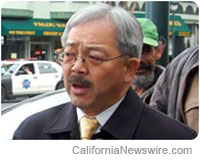 SAN FRANCISCO, Calif. /California Newswire/ — SF Mayor Edwin M. Lee and Board President David Chiu on Tuesday introduced a proposal to reform the City’s current anti-job business tax structure for the November 2012 ballot. After months of thorough analysis by the City Controller, economic modeling by the City Economist and inclusive outreach to San Francisco’s diverse business communities, Mayor Lee and Board President David Chiu proposed a gross receipts tax as an alternative to the City’s current payroll tax, which punishes companies for growing and creating new jobs in San Francisco. The measure also raises $13 million in new General Fund revenue through increased business license fees for affordable housing.
SAN FRANCISCO, Calif. /California Newswire/ — SF Mayor Edwin M. Lee and Board President David Chiu on Tuesday introduced a proposal to reform the City’s current anti-job business tax structure for the November 2012 ballot. After months of thorough analysis by the City Controller, economic modeling by the City Economist and inclusive outreach to San Francisco’s diverse business communities, Mayor Lee and Board President David Chiu proposed a gross receipts tax as an alternative to the City’s current payroll tax, which punishes companies for growing and creating new jobs in San Francisco. The measure also raises $13 million in new General Fund revenue through increased business license fees for affordable housing.
“San Francisco is the only city in California with a payroll tax and it’s time to reward companies for creating jobs in our City, not punish them,” said Mayor Lee. “After months of inclusive, transparent outreach to the City’s diverse business community and many others, President Chiu and I are proposing comprehensive business tax reform for this November that ends our tax on jobs, protects small business and will bring stable, growing revenue for vital City services and affordable housing for the future.”
“As a former co-founder of a small business, I have long understood the business community’s complaint that our current business tax discourages hiring by directly taxing payroll,” said Board President Chiu. “By creating a more equitable gross receipts system, this proposal moves us in a better direction and will directly encourage job creation.”
San Francisco currently imposes a tax on the payroll expense of persons who conduct business in the City. The tax is levied at a rate of 1.5 percent against a business’s taxable payroll expense, which includes all compensation a person pays to individuals for services performed in the City. The City exempts small businesses with less than $250,000 in payroll expense.
The proposed Gross Receipts Tax Ordinance imposes a gross receipts tax and a gross expense tax on businesses in San Francisco, phased in over five years beginning in tax year 2014 to reduce the business payroll expense tax rates based on the amount of gross receipts tax collected, establishes business registration fees based on gross receipts and gross expenses, and amends the current business registration fees to generate $13 million in additional revenue for the City’s General Fund.
Under the proposal, small businesses that earn less than $1 million annually in gross receipts are exempt from business tax, with progressive rates and schedules for gross receipts over $1 million based on business activity and total gross receipts, or revenues. More than 30 other California cities and most other large cities, including Los Angeles and Oakland, levy gross receipts taxes on local businesses.
The legislation enacting the gross receipts tax would phase-in the new tax at increasing rates, over a five year period. In the first year, the City would impose a small gross receipts tax, and a slightly reduced payroll tax. In subsequent years, the gross receipts tax would increase according to the approved schedule, while the payroll tax would be cut according to a formula described in the legislation. The formula would reduce the payroll tax rate based on how much gross receipts tax revenue was generated in the previous year, with the goal of revenue-neutrality in each year.



